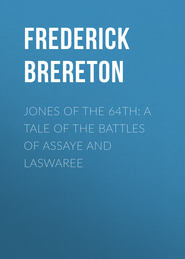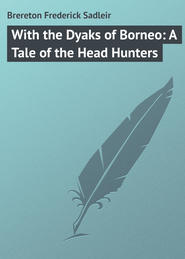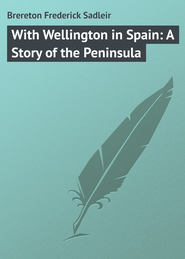По всем вопросам обращайтесь на: info@litportal.ru
(©) 2003-2024.
✖
Roger the Bold: A Tale of the Conquest of Mexico
Настройки чтения
Размер шрифта
Высота строк
Поля
"Then we must search for a Spaniard, though 'twill be hard to find one in this country at this time, save and except the ambassador, who, I fear, bears us no great good will."
The earl took one last look at the golden disk, and was about to turn away, when there was an interruption. Cries were heard from the crowd, who stood staring at Peter and the gentlemen speaking with him, while a crossbow man could be seen pushing his way toward the barrel. He was a huge fellow, standing some six feet four, and his height was increased by the iron cap which was perched upon his head. More than that, as he drew nearer it was seen that he was merely a youth – a youth of unusual size and weight, upon whose jerkin were displayed the familiar arms of the house of Essex. Fresh-complexioned, and with dark-brown hair, this youthful crossbow man was a handsome fellow, and carried his many inches well. But as he neared the earl he halted, took his bow from his shoulder, and knelt on one knee.
"The tale came to me that an interpreter in the language of Spain was required, your grace," he said. "I pushed through the crowd to hear more of what was wanted, and see if I could be of service, for it happens that I was born in Spain, and speak the tongue as well as my own."
"And perhaps the silver groat was an attraction, my lad. Come, now, I see you bear my arms, and are therefore in my service. Your name and age, and how comes it that one born in Spain is of such a height?"
"I am English born, your grace," was the answer, as the young fellow drew himself proudly to his full height. "There is no trace of Spanish blood in me, for my father and mother are both of this country. My name is Roger de Luce, and I have been tall since I was ten years of age. I am now just eighteen, if it please you."
"A fine-grown lad, who has done well with English feeding. And son, I have little doubt, to my tried and trusted Raven de Luce, captain of the crossbow men. How come you to speak this Spanish tongue?"
The earl looked closely at the tall young fellow, noticing his frank and open features, his unconscious air of determination and breeding, and the stalwart frame, which belonged to a man of thirty rather than to a youth of eighteen. Big men were not so often to be met with in those days, when London harboured only some two hundred thousand, and the earl secretly congratulated himself upon having such a champion in his ranks.
"Come," he said, "you are no commoner; that I can see with half an eye. Besides, I know your father to be fit for higher things than captain of one of my bands. How did you acquire the language?"
"I was born in Spain, your grace, when my father went in the suite of your uncle to the court of Ferdinand. My mother accompanied him, and we were there, but for a visit home on two occasions, for eight years in all. There I learned to speak the tongue as well as our own, and I have since kept it up with my father, for he thinks that the time may come when it may be of service to me."
"And to others, thereby winning you reward. Let us hear you translate, and perhaps this worthy fellow here will let us see his silver groat."
"Willingly. Here it is, Roger, and I may as well tell you now something of the reason for asking this service of you. Here is a golden plaque, sent to his Majesty of Spain, so it is said, from his lieutenants, who are bent on discovery in the Indies. 'Twas captured from a Spanish galleon by a Frenchman, whom we in turn despoiled. Here is the parchment attached, and here the silver groat in payment of your services."
All crowded about the tall youth now and listened intently, the earl showing as much enthusiasm and eagerness as any one. Roger took the plaque and spread out the roll of parchment attached.
"It was written a year ago," he said, "and this is the translation: 'To his most Catholic Majesty, King of Spain and of all the Spanish possessions beyond the sea. The plaque forms part of an offering which we, your lieutenants in the Indies, humbly send you, praying for your acceptance. We are about to set out for this city of which report has reached us. It lies on the Terra Firma to the due west of Cuba, and somewhat south after making the northern cape of Yucatan. We have it from the natives that the city is called Mexico, and surpasses anything ever dreamed of in magnificence and wealth. The peoples who inhabit it and the cities lying about the lake engraved on the plaque, have abundance of gold and stones, and their store of treasure is held in the city of Mexico, in that portion beyond the central square where the animals are shown. But the part is not named, for these Indians do not read nor write. They describe all that is seen or that happens by means of pictures and engravings. But the treasure lies within a small radius, and shall be ours. We go to conquer for your sacred Majesty, to colonize, and to bring the holy Catholic faith to these heathen. – Fernando Cortes.'"
"The last?" suddenly exclaimed the earl. "Whose was the signature?"
"Fernando Cortes, governor of the Terra Firma."
"Then there is truth in this plaque," said the earl, showing some trace of excitement. "I have heard of this valiant Fernando Cortes. He finds new lands and new treasures for his king every year, it seems. Good fellow, this plaque would interest his most noble Majesty. Trust it to my charge, and I will give you a sealed receipt for it. Or better, come with the relic to Greenwich to-morrow at noon, and bring the plaque with you. You shall have audience of the king, and this Roger, who has done us this service, shall be there, too, to meet you and translate. Such tales as these, when truth is obviously behind them, must be borne to the king's ears, for it is well that he should hear of these far-off lands, for mayhap he would care to have a finger in the pie which the King of Spain is picking. To-morrow, then, at noon, at the door of the palace at Greenwich."
He beckoned to Roger to follow him, and at once turned to leave, the young crossbow man elbowing a way for him through the crowd to his chair or coach. A minute later the earl had entered, and the horses were in motion, two men being at their heads. Roger fell in behind, his mind full of the Indies and of the visit planned for the morrow.
CHAPTER II
Off to the Terra Firma
A proud day it was for those who, at the order of the earl, attended at the door of Greenwich Palace, and great was the emotion of Peter Tamworth. He appeared in the most brilliant raiment, borrowed, if the truth had but been known, from an accommodating dealer, and looking on this bright morning more weather-beaten than before – his squat figure and his huge nose calling unwonted attention to him. Roger de Luce joined him as the hour for the interview arrived, looking taller than ever, and more substantial. He, too, had donned his best apparel, and still carried his crossbow.
"This way. Follow, an it please you," said an attendant, suddenly opening the gate, to the alarm of Peter, who was more than excited at the thought of the meeting. "Rub your shoes against the broom, and enter quietly. His grace awaits you within, and will take you to the king. Remember to kneel to his Majesty."
He led the way through a long corridor till he came to a large chamber hung with tapestry, and with an arched exit leading into the interior of the palace; and here the Earl of Essex met them.
"You have the plaque?" he demanded shortly. "Then, keep it covered till the king's Majesty makes application for it. Now follow."
He went through the archway, Roger and Peter coming close on his heels, the former cool and unruffled, while Peter grew hot with uneasiness; for he had fears lest this attack upon the Frenchman should lead to trouble, and lest King Henry the Eighth, whose reputation was well known, should take a fancy to the plaque and insist on keeping it. However, they had little cause to be nervous, for King Hal on this fine morning was in the best of humour.
"Show this relic, rascal," he said, as he stood beside the earl in a window niche, "and relate how it came into your hands, leaving nothing of the incidents of the fight to be imagined. By my faith, Essex, 'tis a giant you have here, this crossbow man – or youth, I should have said. How old is the lad?"
He directed his last question at Roger, who fell on his knee, and answered.
"Eighteen! Then England need have little fear while she continues to possess such sons. A fine body-servant, Essex."
"And an interpreter, sire. He and his father were in service with our mission at the Court of Spain some years ago."
For an instant a cloud swept across the brow of the king, for at this time he still remembered the opposition he had met with regard to his cherished wish for a separation from his queen, Catharine of Aragon. Then he stretched out a hand, and took the plaque from Peter.
"A sea dog," he said, in his blunt, loud tones, staring at the sailor, while the latter quaked; "a sea dog who has fought and won, and fought and lost many a time. Is it not so?"
"And who hopes to fight again, as it please your Majesty. There is news here which would give fighting to many a man of yours, and some wealth besides. The Indies are filled with pearls and gold."
"And you would have me take them from my brother of Spain?"
There was a half-smile on the lips of the king as he spoke, and thus encouraged, Peter, who had now lost some little of his nervousness, related all that he knew, and told how the plaque had come to his hands.
"I once fell in with a Spaniard who had served in the Indies," he added. "He had been driven from Spain because of some offence to the Church, and therefore he did not hesitate to tell me what he had seen. There are thousands of undiscovered leagues yet, and it may be that some few might come to the hands of the mighty king of England. There are men on the sea who could do for you what these others have done and are now doing for Ferdinand of Spain, if only the permission were given them, and the money with which to purchase ships and stores at their hand."
"The rascal tempts me to become an adventurer," laughed the king, looking closely at the plaque. "But let us hear about this engraving of the sun. 'Tis marvellously wrought, and like you, Essex, I see buildings, roads, and beasts, and boats upon the water. Let the interpreter tell us of the writing."
With a nod Roger was beckoned forward, and at once translated, his fluency delighting the king.
"Truly a valuable man to send on such an expedition," he whispered to the earl, "for he speaks the Spanish tongue like a native, and he is stalwart and strong. This tale of foreign lands tempts me, for I aspire to extend my dominions. Let this sailor have the plaque and retire with the youth. We will speak quietly together."
What happened at that interview it would be impossible to state. But the result was soon felt by Peter Tamworth, and by Roger de Luce; for hardly had a week passed, and the memory of their interview with the king was still fresh to them, and much in their minds, when a stranger presented himself to each in succession. He was a knight in poor circumstances, by name Sir Thomas Brice, and he came armed with authority to speak.
"There is a large brigantine lying in the river," he said, "and I am in want of men to man her. Her mission is a secret one, at which you can guess. She is bound for the Indies. At this moment all manner of stores are being loaded aboard her, together with guns and weapons. Will you come with me and form part of my crew?"
Sir Thomas, a tall and courageous-looking man, who had already won a reputation in the wars with France, waited to see what effect his message had, and then commenced to speak again.
"There is no need to decide at once," he said quietly. "Meet me to-night at the Swan Tavern, in Cheapside, and there we will discuss the matter. For you, Roger de Luce, I have the Earl of Essex's sanction for your absence, and his wishes for you to form one of the exploration. We go to discover this city which was engraved on the plaque, and also to see whether we cannot oust these Spaniards."
Acknowledging Roger's salutation he strode away again, leaving the latter to think the question over, and discuss it with his father.
"'Tis a chance which may not occur again," said the latter, though Roger needed no encouragement, for he was eager to go. "There is a plan, which should take you to this part, and maybe you will arrive there before this Spaniard who is known as Fernando Cortes. Then there will be riches for all, and you will win back for our family the position which it once held. For we were not always servants, or soldiers in subordinate positions. Time was when the de Luces held their lands and vassals, and jested with the best."
That night Roger kept the appointment at the Swan Tavern, a famous hostelry, where he met Sir Thomas, with whom was Peter Tamworth and some ten others.
"We sail within the week," said the knight, "and your answer must be given now. There is the share of treasure which you will receive should the expedition prove successful, and then there will be the honour which his Majesty will do to each one of us. In all there will be a hundred gentlemen and men-at-arms, whom the brigantine can just accommodate. Now, will you come?"
"Willingly," said Roger. "The share which is promised will be suitable, and I promise to do all that I can to make the expedition successful. Should we fall in with the Spaniards, I shall be able to deal with them, for I speak the language."
"And if the tongue fails, I warrant he will be able to deal with them in other ways," laughed one of the gentlemen present. "We are fortunate in having this young giant. Now, Sir Thomas, we have to find a sailing master, and our crew is completed, for the men-at-arms have already been enrolled."
In fact, those who were leading this expedition had little difficulty. There were too many applicants, for it wanted but a day for the secret to leak out, and it flew swiftly through the city of London. Seafaring men, old sailors, and adventurers came forward in scores, and from amongst them the most suitable were chosen. Then, having filled up with provisions and water, and having taken aboard a plentiful supply of gunpowder and arms, the brigantine slipped from her moorings, and slid down the River Thames. A thousand eyes followed her as she went. Nor did the knight, who commanded her, and his crew meet with the smallest adventure till they had crossed the Atlantic Ocean, then an almost unknown sea, at least to the English, and come into the neighbourhood of the island of Cuba. A fair wind carried them directly on their course, and during the voyage they met with few matters of great interest. As for Roger, once he had recovered from his sea-sickness, he found the life delightful. In spite of his height and his look of age, he was as much a boy as any young fellow of eighteen years, and skylarked about the vessel with Philip Heasman, son of one of the gentlemen adventurers who had taken shares in the ship.
"I love to look over the side and see the water running past us, Philip," he said, once they were out of the channel, and had come to a part where the sea ran in long low swells. "Then at night I lie in my bunk and listen to the swish of the water alongside, and that sends me to sleep."
"And keeps you so till some one has kicked you to awaken you again," laughed his friend. "I declare that I have a big task every day and night, for when we are off watch you seem to sleep all the time, and I have to look to it that you turn up on deck at the appointed hour. I suppose it's because you are so long, and have overgrown your strength."











